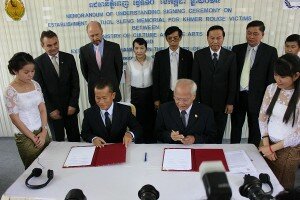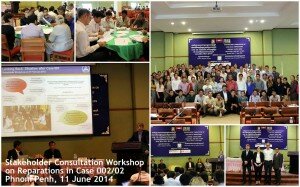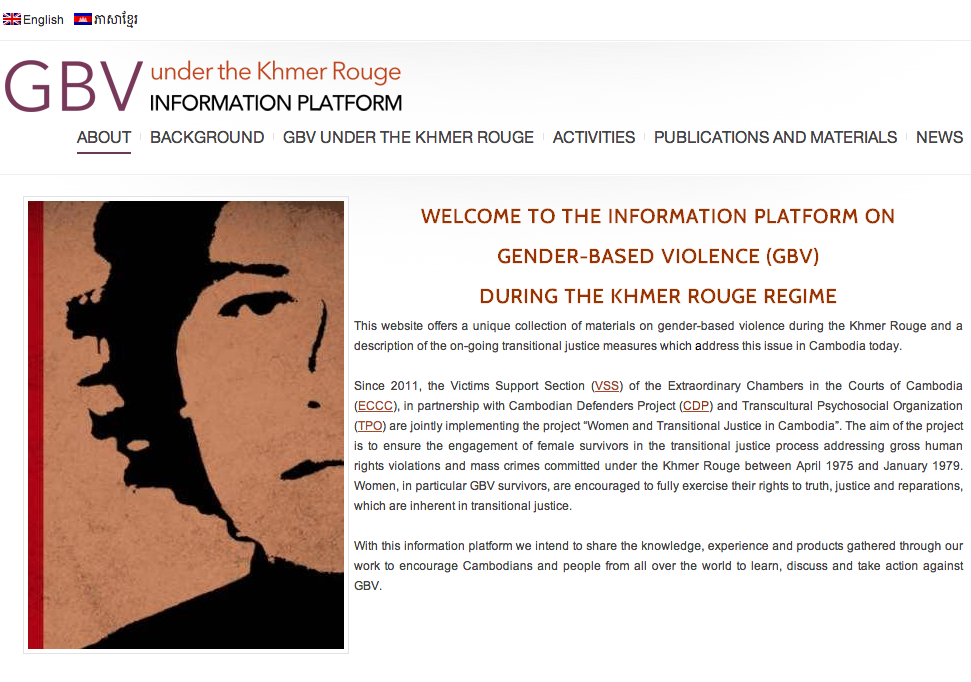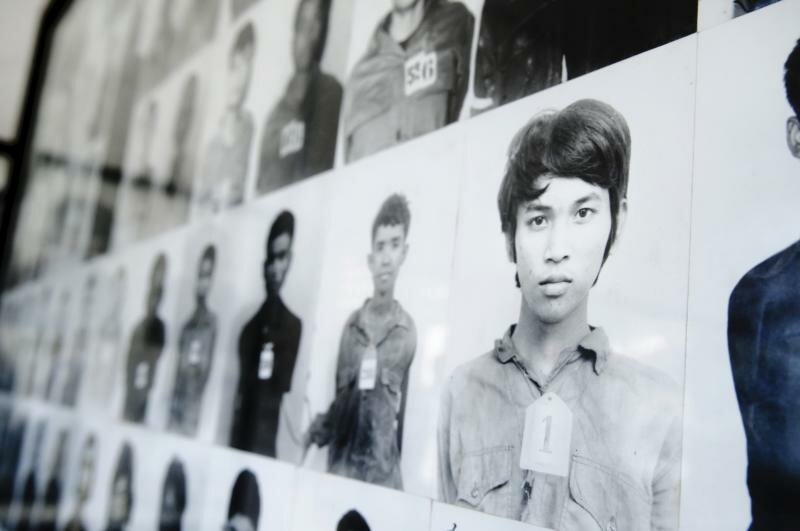
Civil Peace Service
Justice and reconciliation in Cambodia
The aftermath of the Khmer Rouge has continued to emotion- ally devastate Cambodians for almost forty years. Brutal torture, sexual violence against women, starvation and mass killings occurred from 1975 to 1979, and resulted in the death of 21 percent of Cambodia’s population, or 1.7 million people. Several high-level Khmer Rouge war criminals have been on trial in the Khmer Rouge Tribunal since 2010, which has already resulted in one guilty verdict.
To strengthen the reconciliation and the peace-building process, the Civil Peace Service (CPS) ensures that Cambodian citizens and Khmer Rouge survivors are thoroughly informed about Tribunal processes to foster public opinions about the outcomes. It is hoped that understanding, and a feeling of citizen ownership of the legal process will result in a genuine sense of justice.
Cambodian civil society and government institutions in partner- ship with CPS carry out outreach and education about the Khmer Rouge Tribunal. Since 2007, several civic groups and the Victims Support Section of the Tribunal have implemented outreach programs in all provinces of the country.
In public forums, representatives from the Tribunal respond to questions from the people. These events are aired on the radio, thereby addressing an even wider audience, as survivors call in to share their thoughts and experiences. As a result, two movies have been produced addressing forced marriages during the Khmer Rouge regime and truth telling.
A lasting and powerful educational legacy for future Cambodian generations will tell the story of survivors of the Khmers Rouge. These stories reach other Cambodian women, men, young people and children through a wide range of engaging outreach materials.
Please click here for more information.
Signing ceremony for Memorial at Tuol Sleng Genocide Museum
German Ambassador Joachim Baron von Marschall and GIZ Country Director Mr. Adelbert Eberhardt witness the signing of the Memorandum of Understanding by H.E. Chuch Poeurn, Secretary of State of the Ministry of Culture and Fine Arts, and H.E. Kranh Tony, Acting Director of the office of Administration of Extraordinary Chambers in the Courts of Cambodia (ECCC) on the establishment of a memorial for Khmer Rouge victims at the Tuol Sleng Genocide Museum, Phnom Penh, on 10 July 2014.
The funds for this memorial have been provided by the German Ministry for Economic Cooperation and Development (BMZ) through German Organization for International Cooperation (GIZ) as part of the German support for the ECCC Reparation Program 2013-2017, an extensive program of eleven reparation projects and five non-judicial measure projects for the benefit of the victims of the Khmer Rouge which is coordinated by the Victims Support Section of the ECCC.
Please follow the link below for the speech of the German Ambassador Joachim Baron von Marschall:
http://www.phnom-penh.diplo.de/Vertretung/phnompenh/en/00__start/Unterzeichnung_20MoU_20-_20Bo_20Rede.html
Stakeholders Consultation on Reparations for Victims of Khmer Rouge
A successful Stakeholders Consultation on Case 002/02 Reparations: Lessons Learned, Best Practices & Next Steps, presided over by H.E. Tony KRANH, Acting Director of the Administration Office of the Extraordinary Chamber in the Courts of Cambodia (ECCC), was conducted on 11 June 2014 in Phnom Penh.
In preparation for the next trial, Case 002/02 which is about to start End of July 2014, the Victims Support Section and the Lead Co-Lawyers Section of the ECCC consulted with civil party lawyers and representatives of civil society organizations, victims associations, state authorities, and donors to identify and discuss potential reparation requests for the benefit of victims of the Khmer Rouge regime. A wide variety of criminal charges will be included in this next trial, including the genocide of ethnic minorities, forced marriages and rape, and internal purges. Accordingly, the Victims Support Section and Lead Co-Lawyers Section are seeking to develop a diverse range of reparation projects that will address the specific harms suffered as a consequence of the crimes charged, and bring redress to civil parties.
Voices of Participants:
“I am very satisfied with the Stakeholders Consultation, which provided an opportunity to discuss projects that will benefit civil parties of Case 002/02. I wish to make an appeal to national and international donors to please make a donation to our requested reparation projects.”
Mr. CHUM Mey
Civil Party in Case 002 and President of Ksem Ksan Victims Association
++
“I think that this was an excellent opportunity for stakeholders to sit together and discuss the issue of reparations in Case 002/02 for the interest of the civil parties. It was a meaningful and dynamic consultation between the participants and organizers, who collaborated to formulate reparation projects and to request financial support from potential donors.”
Mr. Peou Dara VANTHAN
Deputy Director, Documentation Center of Cambodia
+++++++
CPS Partners Launch First Website on Gender-Based Violence under the Khmer Rouge Regime
The mass crimes committed under the Khmer Rouge in Cambodia in the period of 1975 to 1979 are known to many. Less known is the fact that apart from torture, murder and forced labor, gender-based violence in particular against women was also committed. Even among the Cambodian population the myth of the puritan Khmer Rouge soldier who obeys a code of conduct prohibiting so-called “immoral offenses” against women is prevalent. Such a myth reinforces the taboo on rape and other crimes against women who are thus excluded from the transitional justice process.
In order to thwart this myth and to give victims a voice in the historic record, three GIZ CPS partners in Cambodia have created www.gbvkr.org. This website contains a unique collection of documents, publications, articles, background information and video/audio-material on this topic which mainly originates from the work of the CPS Partners: Victims Support Section (VSS) at the Khmer Rouge Tribunal, Cambodian Defenders Project (CDP) und Transcultural Psyschosocial Organisation (TPO). These three organisations have joined forces to advance the participation of women in the transitional justice process through outreach activities, legal and psychological support and attendance at the Khmer Rouge Tribunal.
Information on violence against women in the Khmer Rouge period is rare and scattered. By setting up this website VSS, CDP and TPO are accomplishing pioneer work in the field of transitional justice in Cambodia in the hope that in future these silenced crimes will be acknowledged and condemned to the same extent as other crimes against humanity.
Dealing with the past
Today’s young Cambodians did not experience the Khmer Rouge’s reign of terror. Nonetheless, their generation is affected by the traumas of the past, which deeply mark Cambodian society.
Sun Py was nine years old when he was separated from his parents and three siblings in 1976. He survived the horrors of the Khmer Rouge regime but suffered considerable distress as a result of losing his family and not knowing what had become of them. Thirty-four years later, Sun Py found those he had lost with the help of a TV programme. Cameras recorded the reunion, capturing the moment when he embraced his mother for the first time and broke down in tears. A year later Sun Py was interviewed by Ly You Y and Lay Rattana for their documentary film “Finding Lost Ones”. He told them: “I feel very happy, both physically and mentally.” He added: “I know my identity.” His mother, who had thought her son dead, described her relief: “I feel like I have recovered from all my illness.” One of the two film-makers who shot the documentary about Sun Py and others, Ly You Y, is 22 years old. That is the average age of the Cambodian population. Like more than 60% of her compatriots, she did not directly experience the Pol Pot dictatorship from 1975 to 1979. Even so, she was affected by it in a deeply personal way: “My mother lost three of her six brothers and sisters during that time,” the young woman explains. Ly You Y made her film in 2011 as part of her studies in the Department of Media and Communication (DMC) at the Royal University of Phnom Penh. The project was supported by the Civil Peace Service (CPS) of GIZ. However, the film-maker had less luck than her main character. Her relatives are still missing: “We did everything we could to find them. But now we have no hope anymore.” They remain among the hundreds of thousands of people who disappeared without trace. For the TV programme “It’s not a Dream”, which reunited Sun Py with his family, Cambodian broadcaster Bayon reported receiving at least 20 missing persons enquiries a day.
Years of terror
Most people search in vain. An estimated 1.7 million fell victim to the Khmer Rouge. That was approximately a fifth of the population at the time. Men, women and children lost their lives in the “Killing Fields” or on death marches. Others starved or died as forced labourers, succumbing to untreated diseases or wounds inflicted by torture. Children witnessed their parents’ execution, wives and husbands saw their partners turned into murderers. Everyone fought for their own survival, humanity disappeared from society. Every family in Cambodia was affected by the genocide – as victims, perpetrators or in many cases both. Anyone who disobeyed orders paid with their own life. Many who became murderers thus see themselves as victims, forced to commit crimes against their will. The consequences are feelings of guilt and shame – and a widespread inability to talk about personal experiences. Even many Khmer Rouge lost family members. Under Pol Pot, Cambodians suffered a collective trauma that was even passed down to later generations. “Traumatised parents are often unable to offer guidance to their children,” explains trauma counsellor Heidrun Ziegler, who worked as a Civil Peace Service (CPS) expert in Cambodia from 2002 until 2006. “Even if adults in a child’s immediate social environment can control their emotions, that child will sense the pressure they are under. In some cases, a child may even develop the same symptoms as its deeply traumatised mother, but it cannot explain where they come from.”
Psychological problems
In the 2012 Cambodian Mental Health Survey conducted by the Royal University of Phnom Penh’s Department of Psychology with GIZ financial support, more than 30 % of women and nearly 20 % of men complained of anxiety disorders. 20 % of women and 10 % of men suffered from bouts of depression. Symptoms associated with post-traumatic stress disorder (PTSD) were reported by three percent of the women and 1.6 % of the men in the sample. The suicide rate in Cambodia is the highest in Southeast Asia. Psychologists at the university are currently working on a youth distress screener, an instrument to identify stress factors among young people. The methodology needs to be tuned to the culture. “The questions we ask to ascertain psychological disorders in a Western survey are not necessarily right for Cambodia,” explains Swiss team member Elizabeth Högger-Klaus. In 2008, the university introduced a master’s programme in psychology, which is now being revised to focus on family therapy. “As the so-called second post-Khmer Rouge generation, children and young people are an important target group and we want to accommodate them by looking at the whole system in which they live: family, friends and school,” says Högger-Klaus. She points out that psychological disorders are not due only to the reign of terror. Poverty, domestic violence and impunity have also played an important role. She sees the problem as one of more than just collective trauma; the cultural and religious context matters too (see side-bar link “Background information). The fact that the country today is ruled by former Khmer Rouge is another obstacle to dealing with the past. They are ministers, provincial governors and village chiefs. Even Prime Minister Hun Sen is ex-Khmer Rouge and shows no interest in revisiting the past. But Hun Sen could not indefinitely oppose the trial proceedings demanded for decades by the international community. After long negotiations with the United Nations, the Khmer Rouge Tribunal started work in 2006. Presided over by both Cambodian and international judges, the special court is tasked with bringing the most responsible members of the Khmer Rouge to account. However, many victims are disappointed in the court because it has so far convicted only one perpetrator. Nevertheless, the court has made the past a public issue. National and international media report on the trials, thousands of victims have been involved in the proceedings. Civil-society organisations grasped the opportunity of campaigning in the context of the tribunal.
Village work
Kdei Karuna is one such initiative. The CPS partner organisation operates a “Justice and History Outreach Program” designed to promote communication about the past in villages and communities – also between parents and children. Workshops are staged to identify community-specific needs and requirements and local moderators are trained in conflict management and dialogue facilitation to support the relevant processes. Sometimes village elders get together with young people and relate their experiences under the Khmer Rouge. Sometimes they express experiences in artworks – which then help them talk about what happened – or the subject is introduced by a film on the experiences of survivors. According to Tim Minea, the Cambodian sociologist who leads Kdei Karuna, the communication initiated in the villages has resulted, for example, in the scenes of crimes being identified for the first time. “Young people are surprised and sometimes shocked to learn where there was a prison in their village or that hundreds of people were killed in a particular place,” he remarks. Tim Minea believes that that promotes understanding for one another and for the events of the past. Communication helps address traumas and makes reconciliation possible within the community. To reach out to many young people, the NGO plans to use online media such as Facebook, blogs and internet forums. New media are also being introduced into the media management programme at the university. Since winter semester 2006/2007, each year of students has made documentaries on Khmer Rouge issues under the guidance of a CPS expert. Many of the films – in which survivors, victims and perpetrators tell their stories – are made in villages a long way from the capital. Later, the finished documentaries are shown in the villages and thus encourage discussion among those who were affected. To reach a wider public, including many young people, the films are also screened on the Internet – for example on YouTube. But dealing with the past is still difficult. Most people spontaneously recoil from it. André Hartlapp, who has supervised the media project since 2012, says: “Given a free choice, students prefer to focus critically on the present, on issues such as youth culture versus tradition, political issues and social issues such as love and relationships.” Ly You Y, who found working on the film project “Finding Lost Ones” a very emotional experience, thinks it is important that young people should confront their country’s past. But she feels that many are still not well enough informed about it. “Lots of political and social problems in our society were caused by the Khmer Rouge regime,” she says. Since graduating, Ly You Y has worked on the media project with Hartlapp. Ly You Y thinks that dealing with the past is something that should always be done with an eye on the future. That is what she particularly likes about her own documentary: “It is a positive film. It can give hope to other people whose relatives are missing.”
Author: Katja Dombrowski
Souce: http://www.dandc.eu/en/article/initiatives-help-young-cambodians-come-terms-trauma-dictatorial-khmer-rouge-regime
Baseline Study of the Cambodian Human Rights and Development Association’s Civil Party Scheme for Case 002
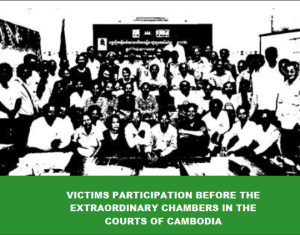
Phnom Penh, Cambodia, Victims’ participation is one of the unique features of the trials held by the Extraordinary Chambers in the Courts of Cambodia (ECCC), also known as the Khmer Rouge Tribunal (KRT). In November 2011, the ECCC Trial Chamber began its second trial, hearing evidence against three former top ranking Khmer Rouge leaders. Nearly 4,000 victims participate as Civil Parties in this second case (Case 002), over ten times more than in the first trial. This unprecedented large number of Civil Parties in an already complex trial poses challenges for the Court, lawyers and NGOs alike to achieve a balance between the rights of victims to an effective participation and the rights of the accused to a timely trial.
Considering this challenge and the limited resources available, ADHOC, the Cambodian Human Rights and Development Association (French Acronym), has established in 2010 a Civil Party Representative (CPR) scheme, to facilitate a two-way communication process between Civil Parties, their lawyers, and the Court. ADHOC acts as the intermediary organisation for nearly half of the Civil Parties admitted in Case 002, providing assistance for their participation in the ECCC’s legal proceedings. The CPR scheme is centred on the role of 122 Civil Party Representatives who act as the focal point and link between the majority of the Civil Parties assisted by ADHOC, their lawyers, ADHOC staff, and the Court.
This study constitutes a baseline analysis for the monitoring and evaluation of the CPR scheme implemented by ADHOC. Specifically, among Civil Parties assisted by ADHOC in Case 002, it aims to examine: (1) awareness, knowledge and attitudes of the ECCC; (2) their perceptions and expectations about justice; and (3) their expectations in regards to collective and moral reparations. It is anticipated that the findings will have broader lessons-learned to inform the participation of large numbers of victims in criminal trials in international and hybrid tribunals dealing with mass atrocities.
Download Baseline Study >>>
Access to legal knowledge granted through GIZ and CIM support
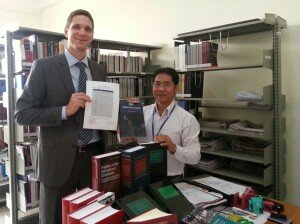
December 2012
Phnom Penh, Cambodia – Knowledge is key to the beholder. In Cambodia, access to knowledge is often weak and resources are limited, constraining professionals and researchers alike. Contemporary libraries are also hungry for resources to supply their readership demands.
In December 2012, GIZ in collaboration with CIM Legal Adviser to the Extraordinary Chambers in the Courts of Cambodia (ECCC), Mr. Simon Meisenberg organized a donation of legal textbooks on international criminal law. The donation totaled to over USD 3,000 in worth, was then handed over to the ECCC Library.
With access to resources, knowledge management also becomes a priority. To address this need, support was provided for a German expert and two Cambodian consultants to assist with the establishment of an on-site, open-source search engine in both English and Khmer languages. This work contributes to the Virtual Tribunal Project of the ECCC, an internet based open media library providing information about the work of the Tribunal.
The German Government’s support to the ECCC is long running and continues to provide financial contributions to the core tribunal budget. To date, more than USD 11 million has supported various projects of the ECCC.
